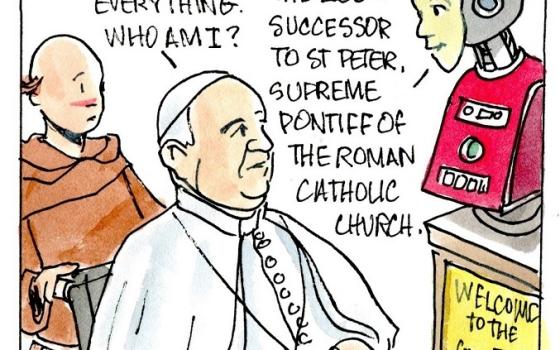Wealth & Responsibility -- Books
 TO BUY OR NOT TO BUY: WHY WE OVERSHOP AND HOW TO STOP
TO BUY OR NOT TO BUY: WHY WE OVERSHOP AND HOW TO STOP
By April Lane Benson, PhD
Published by Trumpeter Books, $16.95
Overshopping is a trivialized, “smiled upon” addiction, reinforced by the messages of a consumerist society, psychologist April Lane Benson writes. But Benson, herself a recovered overshopper, says the addiction’s consequences -- financial, relational, occupational, spiritual -- are serious.
“ ‘More is better’ is a bill of goods we’ve been sold, but research and experience agree on its falsehood,” Benson writes in To Buy or Not to Buy: Why We Overshop and How to Stop. “When acquisition is the standard, happiness is always the next purchase away, or the one after that -- an infinitely receding horizon that keeps sliding farther into the distance.”
In this book, Benson offers a step-by-step process of understanding the roots of compulsive spending and learning to overcome the urge to satisfy one’s emotional needs with material goods.
She is up front that it will not be easy or quick work. The journal exercises that help delve into the reader’s attitudes toward spending and money are thorough, and the recovery process includes such activities as rehearsing and role-playing shopping experiences in ways to help the person identify physical and emotional triggers and to learn how to walk away without pulling out the credit card. The last section discusses ways to draw on spiritual resources -- meditation in particular.
The exercises rely heavily on keeping a “shopping journal,” which brings me to one caveat: Given the target audience, it seems opportunistic and counterproductive to sell a “pre-made” journal for $19.95 (more than the price of the book itself) when a simple, cheap notebook with a pocket would do. Yet the author does sell such a thing on her Web site. The product is optional, of course, and the book’s promotion of it is mild, but why dangle in front of a compulsive shopper yet another material good to save his or her soul?
 WHAT YOUR MONEY MEANS (AND HOW TO USE IT WELL)
WHAT YOUR MONEY MEANS (AND HOW TO USE IT WELL)
By Frank J. Hanna
Published by the Crossroad Publishing Company, $21.95
In What Your Money Means (and How to Use It Well), author Frank J. Hanna III is also interested in mindful spending, but on a different scale. This book is specifically addressed to those with a talent for acquiring wealth. “Understood correctly and chosen as an act of service, wealth creation can be as much a vocation as teaching or being a doctor,” writes Hanna, CEO of Hanna Capital in Atlanta and a noted Catholic philanthropist. His book is a systematic inquiry into the question: “Am I spending my money as I ought?”
While there is a clear Catholic influence at work, the book is not explicitly faith-based, but instead uses a philosophical approach to ethical questions involving the use of money. Even those of us who don’t have millions to dispense can benefit from a thoughtful examination of the gifts we have been given. Hanna’s book is an excellent catalyst for just such a process of distinguishing between genuine needs and what he terms “non-essential wealth.” The latter, Hanna writes, “may continue legally to be ours, but it’s not for our use: It’s meant to provide for the common good.”
The goal he proposes, in fact, is to “undertake a lifetime distribution program that will enable us to give away most (if not all) of our non-essential wealth by the time we die.”
Readers will not have to agree with all of Hanna’s conclusions (or his conservative politics, which pop up in the book from time to time) in order to appreciate the framework he offers for engaging one’s conscience in how to spend money and give it away.
-- Teresa Malcolm, NCR staff
 THE GREEN BUSINESS GUIDE: A ONE STOP RESOURCE FOR BUSINESSES OF ALL SHAPES AND SIZES TO IMPLEMENT ECO-FRIENDLY POLICIES, PROGRAMS, AND PRACTICES
THE GREEN BUSINESS GUIDE: A ONE STOP RESOURCE FOR BUSINESSES OF ALL SHAPES AND SIZES TO IMPLEMENT ECO-FRIENDLY POLICIES, PROGRAMS, AND PRACTICES
By Glenn Bachman
Published by Career Press, $15.99
At 287 pages, The Green Business Guide is a comprehensive resource designed to help organizations and businesses to incorporate green practices into their operations. It includes chapters that can help any kind of organization to understand the environmental factors that influence business; to evaluate the benefits of going green; to develop a business plan for transforming an organization; to identify specific actions to reduce energy and water use, control packaging waste, and use resources efficiently. Also included is a chapter on communicating and reporting on environmental successes, together with strategies for using such successes as marketing tools.
The author is president of a management consulting firm in Massachusetts, specializing in assisting organizations that desire to become more ecologically responsible. Printed on recycled paper with soy-based inks, its cover is green, and its contents are ideal for anyone considering moving their organization toward more Earth-friendly practices.
-- Rich Heffern, NCR staff







